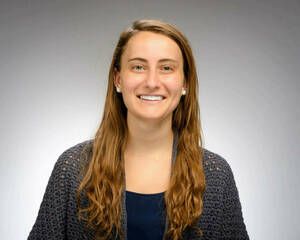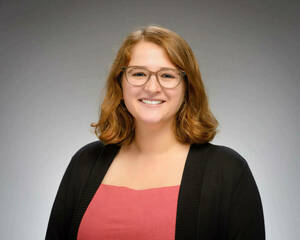From the moment we were founded in 2012, LEO has employed undergraduate economics students as research assistants. Our interns dive into meaningful projects, working both onsite with nonprofit service providers across the country and in-person at Notre Dame with our communications and research teams.
The program gives students a unique opportunity for research experience while also tapping into their passion for LEO’s mission of building evidence and outsmarting poverty. For many, their LEO internship is just the beginning of this work. Past interns have gone on to careers in government, public service, and even as researchers themselves, where they put the skills learned at LEO to use as a force for good in our nation
This summer, as we welcome a new class of LEO undergraduate interns, we check in with past interns to see what they are up to today.
Meet Emily

Emily’s interest in economics started in her high school economics class–actually it was the first class Emily ever thought about outside the classroom. She remembers wondering, “Wait, do people have jobs in economics? Can people do that?” So that’s the first thing Emily did when she came to Notre Dame.
She heard about LEO from her first-year advisor and applied for an internship after working hard to get into and do well in LEO co-founder Bill Evans’ Econometrics class. Next thing she knew, Emily was spending the summer in a field-based internship for LEO partner Catholic Charities Fort Worth. (see page x in our cover story). “Working with people, collecting data, and being on the ground learning the operations of running an RCT was so interesting,” she said. “There’s a lot of moving pieces and details to really take into account, and that was something that I was learning.”
Emily continued working for LEO part time during the school year. “It’s one of the best ways and one of the only ways to really be involved with research in a meaningful way for Econ in undergrad.”
After graduating in 2020, Emily joined the LEO team as a research associate. “If I have the means to choose what I’m going to be doing with my job, I want to be doing something that dedicates my time and my skills to something that matters or something that seems to be making a difference for people.”
Plus, she explains, “being an RA here is really unique compared to being an RA elsewhere in the economics field. Being an RA for LEO you’re also a project manager. You’re the point person with the providers and there’s an incredible amount of responsibility that you get to have and work with really cool partners all around the country.”
Her time as an RA gave a chance for responsibility and discernment. “It allowed me a place to decide where I wanted to go next, and it ended up being a really great fit.” Now, Emily is confident that she wants to pursue research. After finishing up her position with LEO this summer, she will be heading off to Princeton this fall to pursue a PhD in Economics.
“I’m excited to really just dive into the challenge and know everything that I can about this subject. Interests can develop and change, but I largely want to continue studying poverty, studying applied micro, thinking about policy interacting with people and what we can do to make things better.”
Building evidence and outsmarting poverty will continue to be important to her no matter where she goes. Emily emphasized, “Regardless of where I might end up, it’s going to be at a place that’s doing high-quality research that seems meaningful in this field.”
Meet Vivian

Vivian’s introduction to economics was also in high school, but it was a microeconomics class at Notre Dame that really sparked her interest. Especially when she learned about LEO. “To hear that there was a way I could study microeconomics that had meaning… that was really important and awesome to get involved in,” explains Vivian.
Vivian spent two summers interning for LEO as a research assistant, spending much of her time reading economics research and putting together literature reviews. “I spent a lot of time learning about tiers of evidence and how papers connect to each other. The first step in research is to prove that your research is important.” Familiarizing herself with the academic world of economics sharpened her understanding of how researchers evaluate each other’s work and what makes a study strong.
Vivian graduated a semester early and worked on projects for LEO full-time until beginning her program that summer with the Alliance for Catholic Education (ACE). Following her interest in education research and policy, she spent her time with ACE as a teacher at a disadvantaged school in Oklahoma. She found, “Being in the classroom was really important to me during ACE, and I really enjoyed that direct service, but there were a lot of things going on around me, with decisions being made about education or about my students, that really frustrated me.”
With her experience studying economics and education initiatives at LEO, she couldn’t help imagining ways to improve these students’ outcomes at a larger scale. So she came back to LEO as a research associate in hopes of having a broader impact on education.
Certainty in the research world is hard fought to say the least, but is clear when Vivian is asked what direction she’d like to go next. “Whatever I do, it will be with education.”